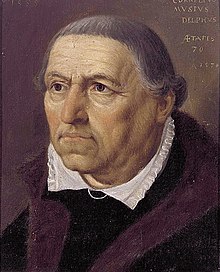Cornelis Musius
Cornelis Musius , also Cornelis Muys (born June 10, 1500 in Delft , † December 10 or 11, 1572 in Leiden ) was a Dutch Roman Catholic priest and monastery rector, humanistic scholar, poet and art collector. Since he was executed for his faith, he is considered a martyr.
Life
Cornelis Musius was born in Delft in 1500. His parents were Johannes Pieterszon Musius , who came from a Dordrecht patrician family, and his wife Elisabeth Woudana. Musius lost his parents very early. On the advice of his guardian, he moved to Leuven to study theology. In addition, he acquired extensive knowledge of Latin and Greek, and also studied the philosophy of Aristotle . During his subsequent stays in Atrecht , Paris and Poitiers, he was in contact with humanistic scholars, with whom he continued to exchange letters for years.
Musius was planning a trip to Italy when he learned that the prior of the Sint Agathaklooster had died in his hometown. In 1538 he returned to Delft. There he was ordained a priest; then he took over the position of prior and confessor of the nuns. In addition to his spiritual activities, Musius was also interested in poetry and wrote pious poems in Latin. He was also very interested in contemporary art; So he appeared as a patron and among other things bought a work by the painter Maarten van Heemskerck , which can still be seen in the former monastery rooms, today's Museum Prinsenhof.
There Musius met regularly with the leader of the rebels, Prince Wilhelm I of Orange , who had moved into Delft in 1572 and taken up quarters in the Agatha monastery . Wilhelm swore Musius to stay in the monastery, because the Orange pursued the goal that people of different denominations live together peacefully. Nevertheless, Musius, who did not feel safe and did not want to leave the money and the valuable art collection of the monastery to the rebels, secretly withdrew with two confidants. Wilhelm then gave the notorious Governor Lumey the order to bring Musius back to Delft. But Lumey, who was already responsible for the murder of the martyrs of Gorkum , did not stick to it. His soldiers intercepted Musius in The Hague and took him to Leiden . To find out where he hid the monastery treasure, Musius was tortured and then hanged in Leiden on the night of December 10th to 11th, 1572.
Musius has been venerated as a martyr ever since , but has not officially been canonized or beatified. Lumey's disobedience resulted in his falling out of favor with the Prince of Orange and losing his post as governor.
Works
- Little Latijnse getijden en gebeden. Delft, ca.1553; Collection de Leiden University Library
- Lijfspreuk
- Non sine fato (later changed to: Non sine Christo )
- Encomium solitudinis
- Imago patientiae
- Institutio foeminae Christianae
- Famularum Desiderii Erasmi libellus
literature
- AJ van der Aa: Biographical woordenboek der Nederlanden. Deel 12. Tweede stuk. JJ van Brederode, Haarlem 1869; Pp. 1176-1180.
- JE van Slee: Musius, Cornelius . In: Allgemeine Deutsche Biographie (ADB). Volume 23, Duncker & Humblot, Leipzig 1886, p. 99.
- A. van Dijk: Cornelius Musius; een Delftse martelaar van 1572. Het Spectrum, Utrecht 1947.
- P. Noordeloos: Cornelis Musius (Mr. Cornelius Muys). Father van Sint Agatha te Delft. Humanist, priest, martelaar. Het Spectrum, Utrecht 1955.
- Engelbertus van Delft: Meester Cornelis Muys. De laatste pater van het St. Agatha-convent te Delft. Geert Groote Genootschap, 's-Hertogenbosch 1961.
Web links
supporting documents
| personal data | |
|---|---|
| SURNAME | Musius, Cornelis |
| ALTERNATIVE NAMES | Muys, Cornelis |
| BRIEF DESCRIPTION | Dutch Roman Catholic priest and rector, humanistic scholar, poet and art collector |
| DATE OF BIRTH | June 10, 1500 |
| PLACE OF BIRTH | Delft |
| DATE OF DEATH | December 10, 1572 or December 11, 1572 |
| Place of death | Suffer |
